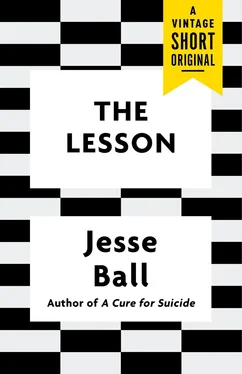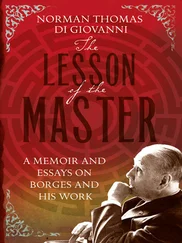— Does he have any particular objects he likes to keep around himself?
— Well, a chess set that we bought him, and a whitish colored stick.
— A whitish colored stick?
— Yes.
— How long is it?
— About this long.
— And you say it’s a stick.
— Yes. He put marks in it and he uses it as a ruler, to poke things, and to reach things that are high up. It’s kind of hooked on the end.
— Like a bird talon?
— I don’t know, said Stan’s mother. I don’t know that. Anyway, is he learning or not? How is his chess?
— It is…
There was another knock at the door, very slight, and then another louder, and then a tumult of banging and shouting. The door, which actually had not been properly closed, swung open, spilling three or four boys and a girl or two onto the hall carpet. These were the selfsame ones who had been following Stan’s mother before. Now, here they were again.
— What are you doing? she asked.
— Just waiting for you, they said. We got impatient.
— If you are going to wait, then wait. If you are going to be impatient, there is a glue factory that way. That’s where orphans go, and not to work, either.
They all laughed a hearty laugh together at that.
— We are ready for you to come out, they said, completely disregarding the glue factory scenario.
— If you’ll pardon me, said Stan’s mother to Loring.
She took up an atlas that was leaned against the wall and drove the children out with furious blows. She really was quite strong, you know.
When the children were gone, she came back.
— They are always after me, she said.
— It is true in my experience, said Loring, that they want to be near you. Who can say why.
— We will be over here! came a shout from outside.
A quick look into the distance would have made clear that the children were balanced on several lightpoles. How they had climbed them is unknown. In fact, neither woman looked out the door. Instead, they were concluding their business.
— I will bring him tomorrow.
Loring nodded.
That Evening by the Light of a Candle
Loring sat remembering things. She remembered an orange sail that had often been on certain boats. This sail had gone out of use. It was now no longer to be found. Although once it had been so common that all recognized it by sight, now there was not even a single one in existence. It had been many years since she had last looked out to sea, and found there, darting above the horizon, that particular cloth, angle, texture.
Next she thought of the weather, and how it seemed to be true that everyone felt weather was different during childhood. Of course, it couldn’t be true. She thought of her own childhood, and of the weather then, and discovered that she too felt the weather was different. Although, of course, she thought, I lived in a different place. Most everyone ends up in a different place from the place of their childhood, and so it makes sense that the weather would be different. But then she thought, perhaps that’s not true. Many people stay in the same place.
Once, she said to herself, there was that storm at the zoo. We had gone to the zoo, and torrential rains came. The zoo had just been built that year, and they hadn’t known much about zoo-building, and certainly not about flooding, for all the cages began to flood when the rain came on. Such a rain, not in all the remaining years have I seen its like. She thought about how she and her father had sheltered under a tree and had watched the animals drowning. She had cried and cried. Her father had not covered her face. Rather, he pointed out how sad it was.
To come all this way, he had said, and then die in a cage.
That had been the first public photograph of Loring. A photographer had taken it just as she and her father left the zoo, the rain abating. Behind them a ruined, broken landscape, with dead animals here and there. And she, dressed in a blue smock with her single braid wound tight about her neck. Of course, in the photograph, the smock was not blue.
— And now we are going to try something, said Loring.
The two were in the bedroom, where they hadn’t gone before.
— And now we are going to try something. Please, go, stand there by the window.
Stan went and stood by the window. A light fell now on the front of his face and shoulders.
— Would you mind, she said, putting on this jacket?
It was one of these very light jackets that aren’t really for wearing outdoors, and have buttons like those on a shirt. This one was grey.
— All right, he said. Is this for me?
He put the jacket on. It fit quite well.
— It is, she said.
— Thank you.
Loring watched him there a moment.
— Keep looking out the window, she said. Don’t turn around.
She was wearing unusual clothing: a Chinese style shirt that buttoned on one side, in muted but iridescent green like a fish seen in muddy water; a pair of broad khaki pants; and her hair was tied up in a kerchief. The matter is confused, but becomes clear when one sees the photograph that she then took out of her pocket. In it, she, a younger woman, is wearing the same clothing, the Chinese shirt, the pants, the kerchief. She is standing by the window of a bedroom, beside a man who is wearing a light grey jacket. The light is falling on their faces, on their shoulders. It would seem the hour is before noon. She has one hand on the windowsill, the other on his shoulder. In the man’s hand is a folded wallet, of thick red paper tied with string. It hangs, held there by his fingers at the bottom right of the photograph. They are neither one young anymore.
Loring went over to the window. The room was small, and one had to go around the bed to get to the window. The floor creaked whenever it was crossed, and she crossed it then.
— Hold this, she said.
She handed him a paper wallet. It was red.
— In the other hand, she said. Now, look out the window.
She took a deep breath, and then stood by him, looking out the window. One of her hands went to the sill, and the other to his shoulder.
— The other hand, she said again, a bit harshly. Put it in the other hand.
— I’m sorry.
He took the wallet and held it in his right hand.
On the bureau, the photograph lay flat, and by the window, her reenactment was a mirror. The light fell on their shoulders, on their faces. Whether her eyes were opened or closed in the photograph, one can’t say, but now they were closed, now they were open, and she was desperately trying to find something, struggling without moving at all.
The boy seemed to sense this. He stood, stock-still, like a deer.
The sound of the clock in the parlor climbed the stair and entered the room.
— I am, she began to say, and stopped.
Open the window, she thought. Open it.
There was a painting on the wall by the bed of a religious procession in a Spanish mountain town. Everyone was hidden under cloth masks, and carrying torches. They were on a steep incline and the village spread out below, its own lights visible in the painted darkness.
He opened the window and turned to look at her.
She took her hand off his shoulder.
— You know, he said. When I came here with my mother, I felt that I had been here before. But now I think that I was never here.
— Never? she asked.
— Either never, or so many times that the place disappears. Aren’t they close to being the same? I think this is an awful place. Many places are awful. I am told I should come here. My mother tells me to; she brings me here. Then I am here, and I do not have the feeling that I was brought here. I know she is my mother, but I do not see why, or why I should go with her, except when she brings me here. Then, I feel — she is serving me, because.
Читать дальше












